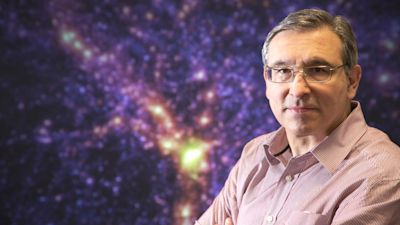Galaxy evolution research wins Durham professor Royal Society honour

A Durham University cosmologist has won a prestigious award for research into how today’s galaxies grew from small fluctuations in the early universe.
Professor Carlos Frenk, founder and former director of Durham’s Institute for Computational Cosmology has been awarded the Royal Society’s Rumford Medal.
Professor Frenk said: “It is, of course, a tremendous honour to be awarded the Rumford Medal by the Royal Society.
"However, I do not view this award as an individual honour, but rather as a recognition of the collective contribution made by my many PhD students, postdoctoral students and other colleagues with whom I have worked closely over the years.
"Their hard work and inspiration lie behind the achievements that are being rewardedby the Rumford Medal.”
The Professor of Fundamental Physics, at Durham University, works with scientists across the world to use high-power supercomputers to build model universes, based on the known laws of physics.
The aim is to understand how the universe evolved from the simplicity of the ‘Big Bang’ to today’s complex state full of myriad structures such as galaxies, stars and planets.
Check out this video of a simulation of the formation of galaxies in a typical region of the universe.
Courtesy of Dr. R. Crain and the Virgo consortium for cosmological simulations.
The award is given to outstanding physics research, and previous winners includefamous names such as Michael Faraday and Louis Pasteur.
Sir Adrian Smith, President of the Royal Society, said: “Through itsmedals and awards the Royal Society recognises those researchers and sciencecommunicators who have played a critical part in expanding our understanding ofthe world around us.
"From advancing vaccine development to catching the first glimpses of distantpulsars, these discoveries shape our societies, answer fundamental questionsand open new avenues for exploration.
“On behalf of the Royal Society, I congratulate each of our award winners and thankthem for their work.”